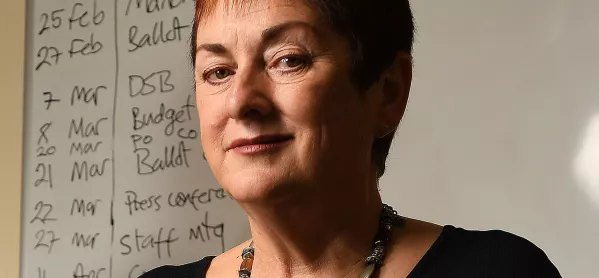- Home
- Ministers are not shaking the ‘magic money tree’
Ministers are not shaking the ‘magic money tree’

So, what to think about yesterday’s leak of the government’s plans for schools?
The headlines are eye-catching. A one-off, £2.8 billion extra for schools. Starting salaries of £30,000 per year for beginning teachers. More free schools and academies. Teachers being supported in using reasonable force against badly behaved pupils.
On closer examination these announcements, like the government’s recent ones on health, start to fray around the edges and begin to look much more like the opening salvos in the general election which undoubtedly will soon be upon us.
Let’s start with funding. While school leaders will be grateful for any pounds falling from the government’s table, it is clear that what is being offered is too little, too late. The one-off figure of £2.8 billion for schools does not reverse nearly a decade of cuts to school funding.
The school cuts coalition has shown that additional revenue funding rising to £12.6 billion per year is needed by 2022-23 just to reverse the cuts imposed on schools through the government’s programme of austerity since 2010.
That’s the money needed to educate the rising pupil population; to pay the increased contributions to the teachers’ pension scheme; to cope with rising inflation.
There is no magic money tree being shaken here.
Nor is there anything in the government’s offer to deal with the damage that has been done to school buildings after a decade of neglect. The National Audit Office calculates that it would require £6.7 billion to return all school buildings to satisfactory or better condition - the main problems being with electrics and external walls.
Actually, I have just reread my last sentence. The main problem with school buildings, in which children and teachers are required to spend their working lives, are electrical and structural. I think that’s a scandal - but there is no money in the government’s announcement to deal with the enormous backlog of repairs and structural work to make our schools safe and secure places to study and to work.
Staying with funding, improving teachers’ starting salaries would be an attractive prospect to any prime minister looking to improve his government’s standing with the profession. But, again, the devil will be in the detail. Would any rises in pay be fully financed by the government, or would schools be left, as they have been left this year, to find the rises out of their inadequate budgets?
And what pay rises could more experienced teachers expect to get? This is a crucial question because teacher supply is threatened not only because the government is unable to meet its teacher training targets for the past six years, but also because the government is unable to keep the teachers it has already trained in the profession. One-third of teachers leave teaching within five years, driven out by a toxic mix of excessive workload that is driven in turn by an out-of-control accountability framework.
While announcements that appear to support the profession, such as the support for teachers to use “reasonable force” to discipline pupils, seem on first glance to be a very good thing, on reflection they pose more questions than they answer.
Who is to judge what is “reasonable” when it comes to teachers using force? I think of myself as a 5ft 4in teacher who, in every single lesson, even in Year 7, taught boys who towered over me. What force, I wonder, would I have felt confident to use?
Teachers do not want to rely on government pronouncements that they can use force. They want to work in well-disciplined schools with consistent and effective behaviour policies. They want school leaders to have the necessary authority to exclude pupils as a last resort - but they do not want these pupils to fall through the gaps and be lost to the education system, with all the devastating consequences that this has for these pupils’ future lives.
Teachers know that their working lives would be more fulfilling and less conflicted if fewer of the children and young people they teach were not themselves suffering from the devastating effects of increasing child poverty caused by the deliberate policies of this government and its predecessors.
They are unlikely to trust the motives, or the professed support, of ministers who have, time after time, voted through measures that have made families poorer. Teachers deal every day with the effects of increased child poverty in children’s inattention and distress and know that it is these causes that need to be addressed if pupils are to behave better and achieve more in schools.
I am not usually a fan of the saying “Never look a gift horse in the mouth”. There are not enough gifts in life and I generally accept any I am given with delight and alacrity. But in this case, I advise a most careful perusal of education policy announcements by Boris Johnson’s government.
I expect lots of sound and fury that will signify nothing.
Mary Bousted is joint general secretary of the NEU teaching union



